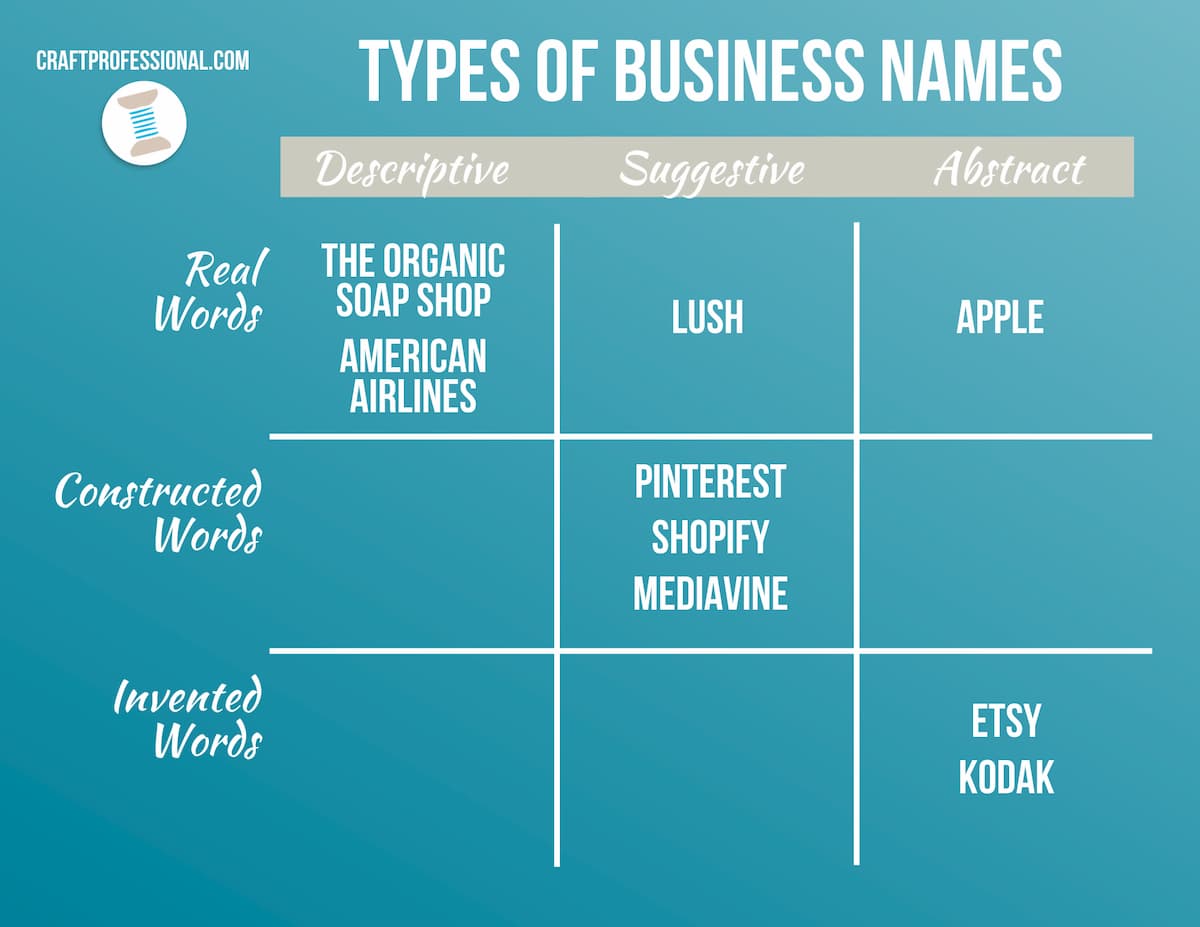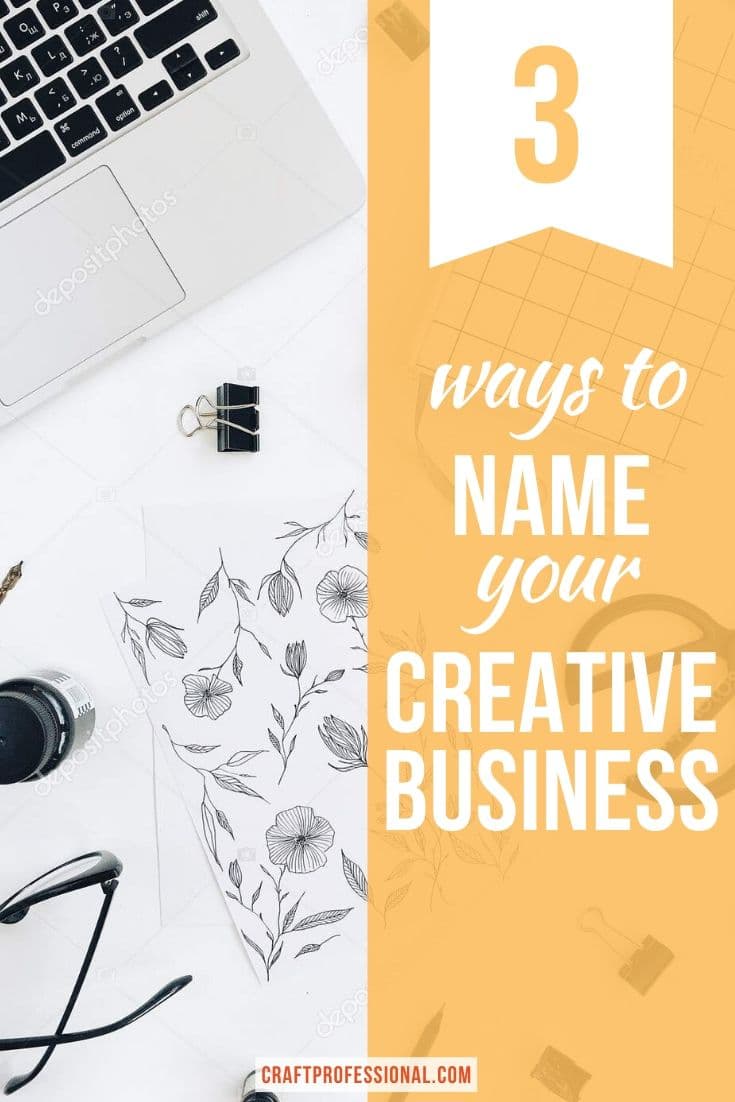Create a Business Name: 3 Ways to Name Your Company
There are only 3 ways to create a business name.
It's amazing to think the varied and unique names of millions of companies that exist were all created in just one of three different ways. But knowing that can help you focus and make smart choices as you work to come up with your own company name.
How to Create a Business Name
The idea of brainstorming business names can feel completely overwhelming.
Where do you even start?
One way to dive into the task is to consider what type of company name you want.
You already know there are 3 ways to create a business name. To make things a bit more interesting, there are also 3 different types of company names.
Here are the major categories.
How Business Names are Created
Company names are created using either:
- Real words
- Constructed words - Invented words that come from recognizable parts of real words
- Completely invented words that are not recognizable in any way
Types of Company Names
Company names fall into one of these three categories:
- Descriptive
- Suggestive
- Abstract
A name will fit into each of those 2 groups. For example, a name can be:
- descriptive and made of real words - like American Airlines
- suggestive and made of a constructed word - like Mediavine
Or any other combination of the 3 ways to create a business name and the 3 types of names.
I earn a commission for purchases made through links on this page.
To learn more, please see my disclosure.
Some of the categories can actually be broken down into smaller sub-categories, but I'm a fan of keeping things simple, so we'll stick with the fundamental types for now.
Let's look at each type and category in some detail.
Favorite Business Naming Resources
Hello, My Name is Awesome by Alexandra Watkins
Brand New Name by Jeremy Miller3 Ways to Create a Business Name
1. Real Words
This category is fairly straightforward. It describes any name that's made of real words that exist in the language primarily used by your customers or where you do business. Alternatively, the name could be made of real words in a different language.
At first glance, it might seem tough to create a distinctive business name using only real words. However, a clever combination of real words can form a name with real character.
Example: Arm & Hammer
2. Constructed Words
This category describes names consisting of words that are made up in the sense that you won't find the words in the dictionary. But they do come from a recognizable root word.
Constructed words might be:
- Compound words - Two real words put together to form a constructed compound word. Example: Pinterest
- An existing word with a suffix added - A real word with a suffix that isn't normally used with that word added to the end. Example: Shopify
- An existing word with a prefix added - A real word with a prefix that isn't normally used with that word added to the beginning. Example: Pantone
3. Invented Words
Invented words differ from constructed words because they are completely made up and not recognizable as real words. Ideally, invented words should feel like real words. They should be intuitive to read and spell.
Example: Etsy
3 Types of Business Names
1. Descriptive
A descriptive name clearly describes the company's product or service.
The Organic Soap Shop is an example of a descriptive company name. It states clearly what the company sells.
Some positive features of this type of name are: it is simple, easy to understand, customers know what you do, it's probably easy to spell.
It can be particularly tough to get the exact match blog domain name if you end up choosing a descriptive name. The URL will probably already owned by someone else.
Also, a descriptive name can be tough to trademark because it is made of widely used terms.
A soap maker in my area who was expanding and trademarking her business had to go through a name change. Her original business name was descriptive, similar to the example above and couldn't be trademarked.
The problem wasn't that someone else already owned the name. The problem was she wasn't allowed to own the words. You can't own words like "organic soap" because they are so common. She had to completely change her business name to something else that could be protected by trademark.
Keep in mind, I'm not a lawyer. If you do have questions about trademarking your business name or other legal issues, please consult with an actual lawyer.
2. Suggestive
A suggestive name doesn't directly describe the company's product or service, but it implies or evokes some quality of the company or the products.
This type of business name is quite popular because it is meaningful and describes something about the company, but it also leaves room for fun, creativity, and adds some distinctiveness to the brand.
Example: Suggestive, Real Word: Lush
3. Abstract
An abstract name doesn't have any built-in meaning that's tied to the business. The company will need to make that connection through strategic branding.
An abstract business name is kind of like abstract art. The meaning of the name will be brought alive by the company.
Example: Abstract, Real Word: Apple
Related: How to name a business from start to finish
Company Name Examples
I've put together a handy chart to help you see how these categories come together to form a specific type of business name. You can see how names of several well-known companies fit in different categories.

I also made a printable version of the business name chart with a quick summary of each type of name, and each way to create a business name, example names, and room for you to include your own ideas.



New! Comments
Have your say about what you just read! Leave me a comment in the box below.